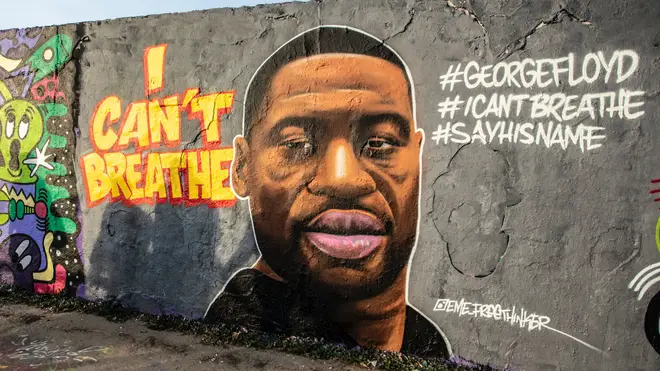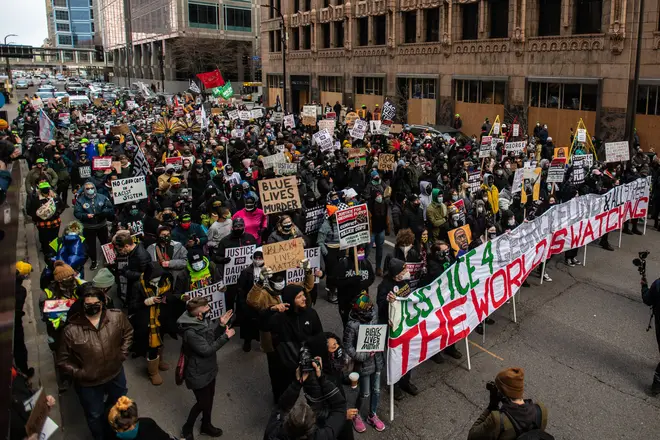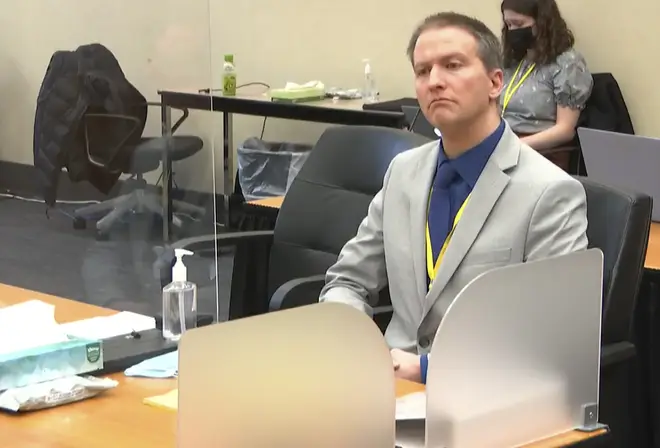
Paul Brand 10am - 12pm
20 April 2021, 22:58 | Updated: 21 April 2021, 00:16

Former police officer Derek Chauvin has been found guilty of the murder of George Floyd following a three-week trial.
Mr Floyd’s death after his arrest in Minneapolis on May 25, 2020 sparked widespread anger after millions of people saw video of the incident.
The video showed Mr Floyd repeatedly crying “I can’t breathe” as Chauvin pressed his knee on his neck.
It sparked protests and sometimes violent riots across the US and the world.
The four officers at the scene were quickly fired and soon charged over his death.
For the latest reaction to the Derek Chauvin verdict listen live on Global Player
READ MORE: Former police officer found guilty of George Floyd's murder
Here is a timeline of key events that began with Mr Floyd’s arrest:
May 25, 2020: Minneapolis police officers respond to a call shortly after 8pm about a possible forgery at a corner shop and encounter a black man later identified as George Floyd, who struggles and ends up handcuffed and face-down in the street. Officer Derek Chauvin uses his knee to pin Mr Floyd’s neck for about nine minutes while bystanders shout at him to stop. Bystander video shows Mr Floyd crying “I can’t breathe” multiple times before going limp. He is pronounced dead at hospital.

Court shown Derek Chauvin body cam footage of George Floyd's arrest
May 26: Police issue a statement saying Mr Floyd died after a “medical incident”, and that he physically resisted and appeared to be in medical distress. Minutes later, bystander video is posted online. Police release another statement saying the FBI will help investigate. Chauvin and three other officers – Thomas Lane, J Kueng and Tou Thao – are fired. Protests begin.
May 27: Mayor Jacob Frey calls for criminal charges against Chauvin. Protests lead to unrest in Minneapolis, with some people looting and starting fires. Protests spread to other cities.
May 28: Governor Tim Walz activates the Minnesota National Guard. That night, police abandon the 3rd Precinct station as protesters overtake it and set it on fire.
May 29: Chauvin is arrested and charged with third-degree murder and manslaughter, President Donald Trump tweets about "thugs" at Minneapolis protests and warns: "When the looting starts, the shooting starts." Protests turn violent again in Minneapolis and some other cities.

Trump calls protesters ‘thugs’ after George Floyd death in police custody
May 30: Mr Trump tries to walk back his tweet. Protests continue around the country and sometimes turn violent.
May 31: Mr Walz says attorney general Keith Ellison will lead prosecutions over Mr Floyd’s death and the nationwide protests continue.
June 1: The county medical examiner finds that Mr Floyd’s heart stopped as police restrained him and compressed his neck, noting Mr Floyd had underlying health issues and listing fentanyl and methamphetamine use as “other significant conditions”.
June 2: Minnesota’s Department of Human Rights launches a civil rights investigation into the Minneapolis Police Department.
June 3: Mr Ellison files a tougher second-degree murder charge against Chauvin and charges the other three officers who were involved in Mr Floyd’s arrest.

June 4: The first of multiple funeral services for Mr Floyd is held in Minneapolis.
June 5: Minneapolis bans chokeholds by police, the first of many changes to be announced in coming months, including an overhaul of the police department’s use-of-force policy.
June 6: Massive peaceful protests take place nationwide to demand police reform. Services are held for Mr Floyd in Raeford, North Carolina, near his birthplace.
June 7: A majority of Minneapolis City Council members say they support dismantling the police department. The idea later stalls but sparks a national debate over police reform.
June 8: Thousands pay their respects to Mr Floyd in Houston, where he grew up. He is buried the next day.

George Floyd laid to rest
June 10: Mr Floyd’s brother testifies before the House Judiciary Committee for changes in holding police officers accountable.
June 16: Mr Trump signs an executive order to encourage better police practices and establish a database to track officers with a history of excessive use-of-force complaints.
July 15: Mr Floyd’s family sues Minneapolis and the four former officers.
July 21: The Minnesota Legislature passes a broad slate of police accountability measures that includes bans on neck restraints, chokeholds and so-called warrior-style training.
October 7: Chauvin posts one million dollar (£720,000) bail and is released from prison, sparking more protests.

November 5: Judge Peter Cahill rejects defence requests to move the officers’ trials, and takes the rare step of allowing cameras in a Minnesota courtroom, citing the coronavirus pandemic.
January 12, 2021: Judge Cahill rules Chauvin will be tried alone due to courtroom capacity issues. The other officers will be tried in August.
February 12: City leaders say George Floyd Square, the intersection blocked by barricades since Mr Floyd’s death, will reopen to traffic after Chauvin’s trial.
March 11: Jury selection for Chauvin's trial begins. The courts carry out a long and careful selection process due to the sensitivity and significance of the case. Those chosen are to be questioned for more than two weeks and almost all of them say they have seen at least parts of the infamous footage with several acknowledging it has given them at least a somewhat negative view of Chauvin. However, they say they can set that aside.

Jury selection paused in trial over George Floyd death
March 12: The city of Minneapolis agrees to pay $27 million to settle a civil lawsuit from Mr Floyd's family.
March 29: Chauvin’s trial begins in Minneapolis. He faces third-degree murder and second-degree murder and manslaughter charges.
April 19: After a three-week trial, in which the court hears evidence from 45 witnesses and watches hours of footage filmed by bystanders, the jury retires to consider its verdict.
April 20: The jury finds Chauvin guilty on all three charges of killing Mr Floyd.